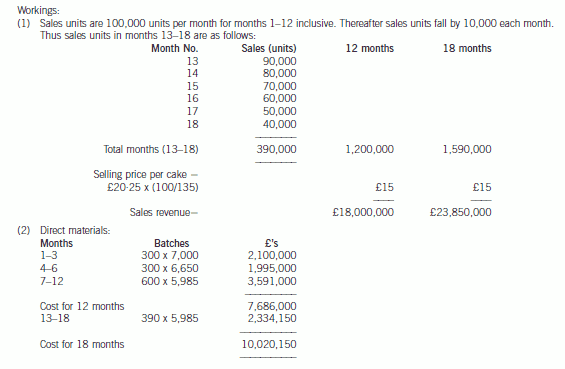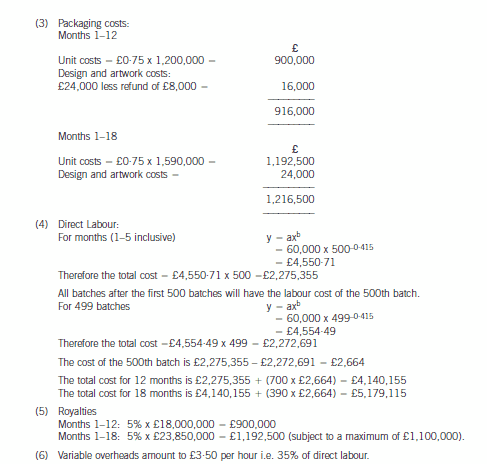ACCA考试报考条件是什么?了解一下!
发布时间:2020-03-13
关于ACCA考试报考条件是什么?不知道的也没关系,下面就跟着51题库考试学习网一起来了解一下吧!
想要报名ACCA考试的学生,必须要具备以下条件之一:
1.凡具有教育部承认的大专以上学历,即可报名成为ACCA的正式学员;
2.教育部认可的高等院校在校生,顺利完成了大一全年的所有课程考试,即可报名成为ACCA的正式学员
3.未符合1、2项报名资格的申请者,可以先申请参加FIA资格考试,通过FFA、FMA和FAB三门课程后,可以申请转入ACCA并且豁免F1-F3三门课程的考试,直接进入ACCA技能课程阶段的考试。
就业认可度高工作岗位遍布全球
ACCA在全球拥有超过7,500家认可雇主,104个代表处,学员会员遍布179个国家,另外还有海外版的ACCA职位公告板帮助您轻松发现职业发展机会。
ACCA共有超过35,000家企业认可,招聘信息都发在ACCA官网职位公告板上,行业覆盖金融服务业、房地产、快速消费品、管理咨询、政府与公共部门等20多个领域。目前日均在线招聘职位数量维持在6000-8000个,其中60%为财务经理、财务总监及以上职位。
其中在中国共有700多家企业认可雇主,除此之外还有外企、民企、国企等各大企业机构发布的大量职位也列明优先选择ACCA。
无论你是刚准备进入职场的新人,还是寻求职场突破的精英人士,成为ACCA会员后,都可以免费通过ACCA职位公告板,为职业生涯的进阶加速。
ACCA考试是按现代企业财务人员需要具备的技能和技术的要求而设计的,共有13门课程,两门选修课,课程分为3个阶段:
第一阶段(知识阶段)(AB MA FA)分涉及基本会计学原理、管理学原理、管理会计基础;
第二阶段(技能阶段)(LW PM TX FR AA FM)涵盖专业财会人员应具备的核心专业技能;
第三阶段(高级阶段)(SBL SBR APM AFM ATX AAA)培养学员以专业知识对信息进行评估,并提出合理的经营建议和忠告。
以上就是51题库考试学习网带给大家的内容,如果还有其他不清楚的问题,请及时反馈给51题库考试学习网,我们会尽快帮您解答。
下面小编为大家准备了 ACCA考试 的相关考题,供大家学习参考。
(c) Temporary staff assignments. (6 marks)
(c) Temporary staff assignments
Lending staff on a temporary basis to an audit client will create the following ethical threats:
Management involvement – Assuming that the manager or senior is seconded to the finance function of the audit client, it
is likely that the individual would be in some way involved in decision making in relation to the accounting systems,
management accounts or financial statements.
Self-review – On returning to the audit firm, a seconded individual could be a member of the audit team for the client to
which they seconded. This would create a self- review threat whereby they would be unlikely to be critical of their own work
performed or decisions made. Even if the individual were not assigned to the client where they performed a temporary
assignment, the audit team assigned may tend to over rely on areas worked on by a colleague during the period of their
temporary assignment.
Familiarity – if the individual is working at the client at any time during the audit, there will be a familiarity threat, whereby
audit team members will be unlikely to sufficiently challenge, and therefore not exercise enough professional scepticism when
dealing with work performed by the seconded individual.
In addition, due to the over-staffing problem of Becker & Co, the seconded individuals may feel that if they were not on the
secondment, they could be made redundant. This may cause them to act in such as way as not to jeopardise the secondment,
even if the action were not in the best interests of the firm.
The threats discussed above are increased where a senior person likely to make significant decisions is involved with the
temporary assignment, as in this case where audit managers or seniors will be the subjects of the proposed secondment.
In practice, assistance can be provided to clients, especially in emergency situations, but only on the understanding that the
firm’s personnel will not be involved with:
– Making management decisions,
– Approving or signing agreements or similar documents, and
– Having the authority to enter into commitments on behalf of the company.
In addition, the individual seconded to a client should not then be involved in any way with the audit of that client when they
return to the audit firm. This may be a difficult area, as presumably the client would prefer to have an individual seconded
to them who has knowledge and experience of their business, i.e. a member of the audit team, and most likely in this scenario
to be the audit manager. If this were the case the manager would then have to be reassigned to a different client, causing
internal problems for the audit firm. This problem is likely to outweigh any benefits, financial or otherwise, to Becker & Co.
If the temporary staff assignment were to a non-finance department of the client then the threats would be reduced.
If Becker & Co decides to go ahead with the secondment programme, the firm must ensure that the staff are suitably
experienced and qualified to carry out the work given to them by the client. There could be a risk to the reputation of Becker
& Co if the seconded staff are not competent or do not perform. as well as expected by the client.
One advantage of a secondment is that the individual concerned can benefit from exposure to a different type of work and
work environment. This will provide some valuable insights into accounting within a business and the individual may bring
some new skills and ideas back into the audit firm.
However, the staff seconded could be offered a permanent position at the client. This would lead to the loss of key members
of staff, and be detrimental for Becker & Co in the long run.
The other benefit for the audit firm is that a programme of secondments will ease the problem of an over-staffed audit
department, and should have cash flow benefits.
Tutorial note: In answering this question it is relevant to briefly mention corporate governance implications i.e. the client may
not be able to accept the services offered by their auditor for ethical, particularly objectivity, reasons.
1 The Great Western Cake Company (GWCC) is a well-established manufacturer of specialist flour confectionery
products, including cakes. GWCC sells its products to national supermarket chains. The company’s success during
recent years is largely attributable to its ability to develop innovative products which appeal to the food selectors within
national supermarket chains.
The marketing department of Superstores plc, a national supermarket chain has asked GWCC to manufacture a cake
known as the ‘Mighty Ben’. Mighty Ben is a character who has recently appeared in a film which was broadcast
around the world. The cake is expected to have a minimum market life of one year although the marketing department
consider that this might extend to eighteen months.
The management accountant of GWCC has collated the following estimated information in respect of the Mighty Ben
cake:
(1) Superstores plc has decided on a launch price of £20·25 for the Mighty Ben cake and it is expected that this
price will be maintained for the duration of the product’s life. Superstores plc will apply a 35% mark-up on the
purchase price of each cake from GWCC.
(2) Sales of the Mighty Ben cake are expected to be 100,000 units per month during the first twelve months.
Thereafter sales of the Mighty Ben cake are expected to decrease by 10,000 units in each subsequent month.
(3) Due to the relatively short shelf-life of the Mighty Ben cake, management has decided to manufacture the cakes
on a ‘just-in-time’ basis for delivery in accordance with agreed schedules. The cakes will be manufactured in
batches of 1,000. Direct materials input into the baking process will cost £7,000 per batch for each of the first
three months’ production. The material cost of the next three months’ production is expected to be 95% of the
cost of the first three months’ production. All batches manufactured thereafter will cost 90% of the cost of the
second three months’ production.
(4) Packaging costs will amount to £0·75 per cake. The original costs of the artwork and design of the packaging
will amount to £24,000. Superstores plc will reimburse GWCC £8,000 in the event that the product is
withdrawn from sale after twelve months.
(5) The design of the Mighty Ben cake is such that it is required to be hand-finished. A 75% learning curve will
apply to the total labour time requirement until the end of month five. Thereafter a steady state will apply with
labour time required per batch stabilising at that of the final batch in month five. The labour requirement for the
first batch of Mighty Ben cakes to be manufactured is expected to be 6,000 hours at £10 per hour.
(6) A royalty of 5% of sales revenue (subject to a maximum royalty of £1·1 million) will be payable by GWCC to the
owners of the Mighty Ben copyright.
(7) Variable overheads are estimated at £3·50 per direct labour hour.
(8) The manufacture of the Mighty Ben cake will increase fixed overheads by £75,000 per month.
(9) In order to provide a production facility dedicated to the Mighty Ben cake, an investment of £1,900,000 will be
required and this will be fully depreciated over twelve months.
(10) The directors of GWCC require an average annual return of 35% on their investment over 12 months and
18 months.
(11) Ignore taxation and the present value of cash flows.
Note: Learning curve formula:
y = axb
where y = average cost per batch
a = the cost of the initial batch
x = the total number of batches
b = learning index (= –0·415 for 75% learning rate)
Required:
(a) Prepare detailed calculations to show whether the manufacture of Mighty Ben cakes will provide the required
rate of return for GWCC over periods of twelve months and eighteen months. (20 marks)



Ms Huang, a shareholder of the Daqing Limited Liability Company (Daqing), found that the general manager, Mr Ding, had accepted bribes from several suppliers, which materially caused losses to Daqing, and adversely affected the interests of all shareholders.
Further examination, through a Certified Public Accountant firm, disclosed that there were a lot of affiliated transactions between Daqing and Everbright Co, which was the majority shareholder of Daqing. Mr Ding was recommended by Everbright Co and appointed by Daqing’s board of directors, which was substantially influenced by Everbright Co. With a series of such transactions Daqing transferred huge profits to Everbright Co and adversely affected Daqing.
Required:
(a) State whether Ms Huang was entitled to take legal action against Mr Ding for his illegal behaviour of accepting bribes which adversely affected all the shareholders. (2 marks)
(b) State TWO different legal actions Ms Huang was entitled to take to protect the rights of Daqing and its shareholders due to the affiliated transactions with Everbright Co. (4 marks)
(a) Mr Ding’s act of accepting bribery violated the criminal law and the relevant rules of the Company Law as well. Besides the criminal charges, he should be liable for his fraudulent behaviour of damaging the interests of Daqing and its shareholders. Therefore, Ms Huang was entitled to bring a law suit against general manager Mr Ding on the ground that his acts caused her loss of interests.
(b) With respect to Daqing’s damage, Ms Huang should first request the board of directors or supervisory board to take legal action against Everbright Co. Where these two bodies refuse to take reasonable actions, Ms Huang might, in her own name but for the interests of the company, bring a shareholder representative litigation against Everbright Co. On the other hand, she might also bring a direct litigation against Everbright Co on the ground that the connected transactions caused indirect damage to the shareholder’s interests.
声明:本文内容由互联网用户自发贡献自行上传,本网站不拥有所有权,未作人工编辑处理,也不承担相关法律责任。如果您发现有涉嫌版权的内容,欢迎发送邮件至:contact@51tk.com 进行举报,并提供相关证据,工作人员会在5个工作日内联系你,一经查实,本站将立刻删除涉嫌侵权内容。
- 2020-05-17
- 2020-01-09
- 2020-03-21
- 2020-01-01
- 2019-12-28
- 2020-01-09
- 2020-01-09
- 2020-02-01
- 2020-02-02
- 2020-01-14
- 2020-03-18
- 2020-01-09
- 2020-09-04
- 2020-01-09
- 2020-01-09
- 2020-01-09
- 2020-02-05
- 2020-01-09
- 2020-05-11
- 2020-02-27
- 2019-07-19
- 2020-01-31
- 2020-03-10
- 2020-04-08
- 2020-01-09
- 2020-05-14
- 2020-05-10
- 2020-05-15
- 2020-01-09
- 2020-01-13